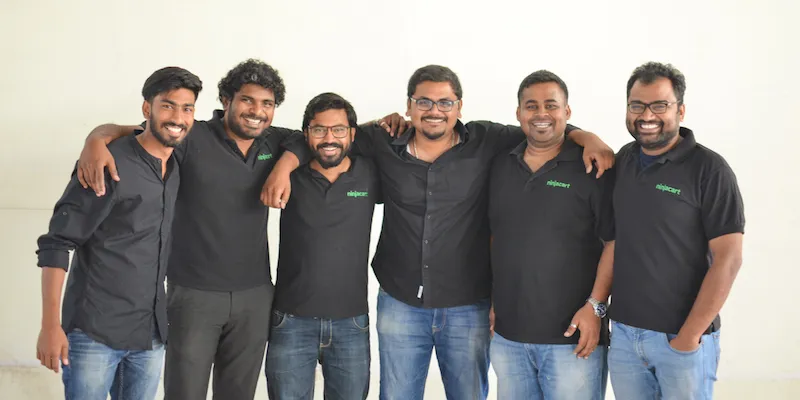
Vodafone
View Brand PublisherNinjacart is tapping into tech to connect farmers to businesses and minimise wastage
Back to the Ready Startup microsite
This article is brought to you by Vodafone Business Services
Bengaluru-based Ninjacart uses state-of-the-art infrastructure to forge a smart supply chain and reduce food wastage.
A 2011 report by the Food and Agriculture Organisation, a UN body, puts wastage of fruits and vegetables as high as 45 percent of produce (post-harvest to distribution) in developing Asian countries like India.
Across the globe, various stakeholders are trying to combat this issue. Closer home, Ninjacart is also leveraging technology to minimise food waste. The online platform enables retailers and merchants to source fruits and vegetables directly from farmers and has successfully done away with middlemen, commission agents and auction agents in mandis.
Ninjacart started operations in May 2015 as a hyper-local grocery delivery company. In six months, the Co-founders, Sharath Loganathan, Thirukumaran Nagaranjan, Kartheeswaran KK, Ashutosh Vikram, Sachin P J and Vasudevan Chinnathambi, decided it was time to change the business

model. They decided to shift their focus to fixing the backend supply chain of fruits and vegetables, and change the way kirana stores and supermarkets sourced their supply, thereby minimising waste.Vasudevan says, “The entire supply chain runs on our in-house ERP. When we pivoted in January 2016, we had a very basic system of inventory management. In the last year-and-a-half, our technology has evolved to an integrated and smart supply chain system that reduces cost and errors, improves speed and delivers a more reliable service levels.” The Ninjacart ERP is built on a modular and scalable framework to accommodate the evolution of their supply chain.
“The supply chain we were aiming to build was unique to India, so developing an indigenous supply chain technology made sense rather than opting for off-the-shelf products,” he adds.
A central data layer runs across system, like a spinal cord. The data system feeds from various ancillary systems, and assimilates real-time data to make decisions in real time. This data is made more readable and – importantly – more accessible to anyone in the organisation through the DIY-query systems. The idea is to give stakeholders more accessibility to the data they need.
All in a day’s work
“Our strong network makes it possible to move produce within 14 hours. Technology plays a major role in route optimisation for faster movement and lower costs. We also do a prediction at customer-level to identify quality expectation mismatch cases based on returns and ‘not-ordered’ cases, to take decisions to reduce wastage,” Vasudevan says.
“We use mobile technology by Vodafone to capture each data point of our supply chain,” he says. The mobile app is a key enabler in ensuring the process carries on without a hitch. “Our mobile app and mobile communications (Calls and SMS) are our primary touchpoints with the farmers,” he says.

Ninjacart has helped farmers take baby steps in changing the way they market their produce. Looking to the future, the team wants to focus on technology, processes and templating the model so it can scale with minimal management.
“We want to reach out to 20,000+ farmers and serve newer markets. We will bank heavily on tech platforms and nodes to reach out, communicate and operate on a daily basis,” concludes Vasudevan.
Vodafone technology that companies like Ninjacart can leverage:
1. A voice portal to interact with farmers
Realising that farmers are more comfortable talking to someone than messaging, Vodafone devised a voice portal. Each farmer has a unique code (the mobile number). Farmers can dial into a toll-free number with IVR in their local language to indicate the quantity and date of availability of produce. This information can be passed on to a logistics team to help plan routes.
2. Real-time updates to stakeholders
Vodafone offers state-of-the-art, robust and secure wireless solutions over a GPRS connection. Scanners, powered by a Vodafone SIM, capture data and deliver real-time information to servers in real time. Updates can be sent to the various stakeholders via various channels like e-mail, SMS, fax and phone.
Liked this story? Read more such inspiring business success stories here.
Back to the Ready Startup microsite







